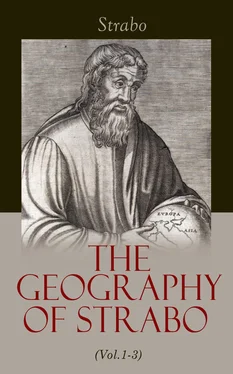Strabo - The Geography of Strabo (Vol.1-3)
Здесь есть возможность читать онлайн «Strabo - The Geography of Strabo (Vol.1-3)» — ознакомительный отрывок электронной книги совершенно бесплатно, а после прочтения отрывка купить полную версию. В некоторых случаях можно слушать аудио, скачать через торрент в формате fb2 и присутствует краткое содержание. Жанр: unrecognised, на английском языке. Описание произведения, (предисловие) а так же отзывы посетителей доступны на портале библиотеки ЛибКат.
- Название:The Geography of Strabo (Vol.1-3)
- Автор:
- Жанр:
- Год:неизвестен
- ISBN:нет данных
- Рейтинг книги:3 / 5. Голосов: 1
-
Избранное:Добавить в избранное
- Отзывы:
-
Ваша оценка:
- 60
- 1
- 2
- 3
- 4
- 5
The Geography of Strabo (Vol.1-3): краткое содержание, описание и аннотация
Предлагаем к чтению аннотацию, описание, краткое содержание или предисловие (зависит от того, что написал сам автор книги «The Geography of Strabo (Vol.1-3)»). Если вы не нашли необходимую информацию о книге — напишите в комментариях, мы постараемся отыскать её.
The Geography of Strabo (Vol.1-3) — читать онлайн ознакомительный отрывок
Ниже представлен текст книги, разбитый по страницам. Система сохранения места последней прочитанной страницы, позволяет с удобством читать онлайн бесплатно книгу «The Geography of Strabo (Vol.1-3)», без необходимости каждый раз заново искать на чём Вы остановились. Поставьте закладку, и сможете в любой момент перейти на страницу, на которой закончили чтение.
Интервал:
Закладка:
10. Lying off this narrow pass along the coast, as you commence your journey from Marseilles, are the Stœchades islands. 1372Three of these are considerable, and two small. They are cultivated by the people of Marseilles. Anciently they contained a garrison, placed here to defend them from the attacks of pirates, for they have good ports. After the Stœchades come [the islands of] Planasia 1373and Lero, 1374both of them inhabited. In Lero, which lies opposite to Antipolis, is a temple erected to the hero Lero. There are other small islands not worth mentioning, some of them before Marseilles, others before the rest of the coast which I have been describing. As to the harbours, those of the sea-port [of Forum-Julium] 1375and Marseilles are considerable, the others are but middling. Of this latter class is the port Oxybius, 1376so named from the Oxybian Ligurians.—This concludes what we have to say of this coast.
11. The country above this is bounded principally by the surrounding mountains and rivers. Of these the Rhone is the most remarkable, being both the largest, and capable of being navigated farther than any of the others, and also receiving into it a greater number of tributaries; of these we must speak in order. Commencing at Marseilles, and proceeding to the country between the Alps and the Rhone, to the river Durance, dwell the Salyes for a space of 500 stadia. From thence you proceed in a ferry-boat to the city of Caballio; 1377beyond this the whole country belongs to the Cavari as far as the junction of the Isère with the Rhone; it is here too that the Cevennes approach the Rhone. From the Durance to this point is a distance of 700 stadia. 1378The Salyes occupy the plains and mountains above these. The Vocontii, Tricorii, Iconii, and Medylli, lie above the Cavari. 1379Between the Durance and the Isère there are other rivers which flow from the Alps into the Rhone; two of these, after having flowed round the city of the Cavari, discharge themselves by a common outlet into the Rhone. The Sulgas, 1380which is the third, mixes with the Rhone near the city of Vindalum, 1381where Cnæus Ænobarbus in a decisive engagement routed many myriads of the Kelts. Between these are the cities of Avenio, 1382Arausio, 1383and Aëria, 1384which latter, remarks Artemidorus, is rightly named aërial, being situated in a very lofty position. The whole of this country consists of plains abounding in pasturage, excepting on the route from Aëria to Avenio, where there are narrow defiles and woods to traverse. It was at the point where the river Isère and the Rhone unite near the Cevennes, that Quintus Fabius Maximus Æmilianus, 1385with scarcely 30,000 men, cut to pieces 200,000 Kelts. 1386Here he erected a white stone as a trophy, and two temples, one to Mars, and the other to Hercules. From the Isère to Vienne, the metropolis of the Allobroges, situated on the Rhone, the distance is 320 stadia. Lugdunum 1387is a little above Vienne at the confluence of the Saone 1388and the Rhone. The distance by land [from this latter city] to Lugdunum, passing through the country of the Allobroges, is about 200 stadia, and rather more by water. Formerly the Allobroges engaged in war, their armies consisting of many myriads; they now occupy themselves in cultivating the plains and valleys of the Alps. They dwell generally in villages, the most notable of them inhabiting Vienne, which was merely a village, although called the metropolis of their nation; they have now improved and embellished it as a city; it is situated on the Rhone. So full and rapid is the descent of this river from the Alps, that the flow of its waters through Lake Leman may be distinguished for many stadia. Having descended into the plains of the countries of the Allobroges, and Segusii, it falls into the Saone, near to Lugdunum, a city of the Segusii. 1389The [Pg 278] [CAS. 186] Saone rises in the Alps, 1390and separates the Sequani, the Ædui, and the Lincasii. 1391It afterwards receives the Doubs, a navigable river which rises in the same mountains, 1392still however preserving its own name, and consisting of the two, mingles with the Rhone. The Rhone in like manner preserves its name, and flows on to Vienne. At their rise these three rivers flow towards the north, then in a westerly direction, afterwards uniting into one they take another turn and flow towards the south, and having received other rivers, they flow in this direction to the sea. Such is the country situated between the Alps and the Rhone.
12. The main part of the country on the other side of the Rhone is inhabited by the Volcæ, surnamed Arecomisci. Their naval station is Narbonne, which may justly be called the emporium of all Gaul, as it far surpasses every other in the multitude of those who resort 1393to it. The Volcæ border on the Rhone, the Salyes and Cavari being opposite to them on the other side of the river. However, the name of the Cavari has so obtained, that all the barbarians inhabiting near now go by that designation; nay, even those who are no longer barbarians, but follow the Roman customs, both in their speech and mode of life, and some of those even who have adopted the Roman polity. Between the Arecomisci and the Pyrenees there are some other small and insignificant nations. Nemausus 1394is the metropolis of the Arecomisci; though far inferior to Narbonne both as to its commerce, and the number of foreigners attracted thither, it surpasses that city in the number of its citizens; for it has under its dominion four and twenty different villages all well inhabited, and by the same people, who pay tribute; it likewise enjoys the rights of the Latin towns, so that in Nemausus you meet with Roman citizens who have obtained the honours of the ædile and quæstorship, wherefore this nation is not subject to the orders issued by the prætors from Rome. The city is situated on the road from Iberia to Italy; this road is very good in the summer, but muddy and overflowed by the rivers during winter and spring. Some of these streams are crossed in ferry-boats, and others by means of bridges constructed either of wood or stone. The inundations which destroy the roads are caused by the winter torrents, which sometimes pour down from the Alps even in summer-time after the melting of the snows. To perform the route before mentioned, the shortest way is, as we have said, across the territory of the Vocontii direct to the Alps; the other, along the coast of Marseilles and Liguria, is longer, although it offers an easier passage into Italy, as the mountains are lower. Nemausus is about 100 stadia distant from the Rhone, situated opposite to the small town of Tarascon, and about 720 stadia from Narbonne. The Tectosages, 1395and certain others whom we shall mention afterwards, border on the range of the Cevennes, and inhabit its southern side as far as the promontory of the Volcæ. Respecting all the others we will speak hereafter.
13. But the Tectosages dwell near to the Pyrenees, bordering for a small space the northern side of the Cevennes; 1396the land they inhabit is rich in gold. It appears that formerly they were so powerful and numerous, that dissensions having arisen amongst them, they drove a vast multitude of their number from their homes; and that these men associating with others of different nations took possession of Phrygia, next to Cappadocia, and the Paphlagonians. Of this those who are now called the Tectosages afford us proof, for [Phrygia contains] three nations, one of them dwelling near to the city of Ancyra, 1397being called the Tectosages; the remaining two, the Trocmi and Tolistobogii. 1398The resemblance these nations bear to the Tectosages is evidence of their having immigrated from Keltica, though we are unable to say from which district they came, as there does not appear to be any people at the present time bearing the name of Trocmi or Tolistobogii, who inhabit [Pg 280] [CAS. 188] either beyond the Alps, the Alps themselves, or on this side the Alps. It would seem that continual emigration has drained them completely from their native country, a circumstance which has occurred to many other nations, as some say that the Brennus, who led an expedition to Delphi, 1399was a leader of the Prausi; but we are unable to say where the Prausi formerly inhabited. It is said that the Tectosages took part in the expedition to Delphi, and that the treasures found in the city of Toulouse by the Roman general Cæpio formed a portion of the booty gained there, which was afterwards increased by offerings which the citizens made from their own property, and consecrated in order to conciliate the god. 1400And that it was for daring to touch these that Cæpio terminated so miserably his existence, being driven from his country as a plunderer of the temples of the gods, and leaving behind him his daughters, who, as Timagenes informs us, having been wickedly violated, perished miserably. However, the account given by Posidonius is the more credible. He tells us that the wealth found in Toulouse amounted to somewhere about 15,000 talents, a part of which was hidden in the chapels, and the remainder in the sacred lakes, and that it was not coined [money], but gold and silver in bullion. But at this time the temple of Delphi was emptied of these treasures, having been pillaged by the Phocæans at the period of the Sacred war; and supposing any to have been left, it would have been distributed amongst many. Nor is it probable that the Tectosages returned home, since they came off miserably after leaving Delphi, and owing to their dissensions were scattered here and there throughout the country; there is much more likelihood in the statement made by Posidonius and many others, that the country abounding in gold, and the inhabitants being superstitious, and not living expensively, they hid their treasures in many different places, the lakes in particular affording them a hiding-place for depositing their gold and silver bullion. When the Romans obtained possession of the country they put up these lakes to public sale, and many of the purchasers found therein solid masses of silver. In Toulouse there was a sacred temple, held in great reverence by the inhabitants of the surrounding country, and on this account loaded with riches, inasmuch as there were many who offered gifts, and no one dared to touch them.
Читать дальшеИнтервал:
Закладка:
Похожие книги на «The Geography of Strabo (Vol.1-3)»
Представляем Вашему вниманию похожие книги на «The Geography of Strabo (Vol.1-3)» списком для выбора. Мы отобрали схожую по названию и смыслу литературу в надежде предоставить читателям больше вариантов отыскать новые, интересные, ещё непрочитанные произведения.
Обсуждение, отзывы о книге «The Geography of Strabo (Vol.1-3)» и просто собственные мнения читателей. Оставьте ваши комментарии, напишите, что Вы думаете о произведении, его смысле или главных героях. Укажите что конкретно понравилось, а что нет, и почему Вы так считаете.












![Anne Blunt - A Pilgrimage to Nejd, the Cradle of the Arab Race. Vol. 2 [of 2]](/books/750183/anne-blunt-a-pilgrimage-to-nejd-the-cradle-of-the-thumb.webp)